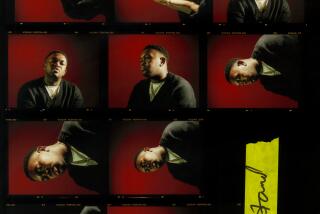Portugal’s Madredeus: The Model of Simplicity
Madredeus does not exactly look like a pop group that has been garnering gold records in Europe and drawing rave notices in tours around the world.
The Portuguese ensemble’s stage performance is a model of unassuming simplicity. Five musicians--two guitarists, an accordionist, a keyboardist and a cellist--seated in a semicircle, wearing dark suits. Standing in the center, garbed in black, is singer Teresa Salgueiro. No special effects other than atmospheric lighting and swirling smoke, and, except for discreet sounds from the keyboardist, no electronics.
Nor does Madredeus’ music immediately appear to explain the devoted following the ensemble has built throughout Europe and the Far East over the last five years. Calm, laid-back, filled with long tones, its smooth instrumental timbres are touched by the exquisite colorations of Salgueiro’s cool but eloquent voice. And there is not a single percussion sound to be heard.
“When we began our group 10 years ago,” says guitarist Pedro Ayres Magalhaes in a phone interview from New York, “we wanted to take people into a very old aspect of music--which is to show how much can be done with acoustic instruments and voice, without recourse to tapes, sequencers, special effects or heavy rhythms.”
The group’s appearance tonight at the Veterans Wadsworth Theater--its L.A. debut--comes at the close of nearly five years of touring and the recent release by Capitol’s Metro Blue division of “O Spirito da Paz,” the group’s first album issued in the United States. (“Ainda,” the soundtrack from the Wim Wenders film “The Lisbon Story,” which features the group as actors and musicians, will be released in September.)
Magalhaes sees the success of Madredeus (pronounced ma-drey-DAY-oush) as a reflection of the players’ determination to remain true to their own interpretations of musical integrity.
“Our effort,” he says, “was to combine an interesting style of classical guitar playing, another way of composing for female voice, and an ensemble without percussion, without boring our audiences. And we wanted to do it without excessive promotion.
“I knew that it was a slower path to choose and that whatever success we achieved would take much longer. But we wanted to make music that was full of truth--something like what happens with jazz and classical music, in which a group of musicians play together without trickery.”
Magalhaes was right about the length of time it would take for Madredeus (which took its name from the Lisbon district in which the members first got together) to discover its audience. The ensemble’s initial few years were spent uncovering the sought-after textural sound, perfecting the visual image--now imitated by a number of European groups--and, especially vital to Magalhaes, finding a way to merge the poetry of Salgueiro’s singing with the instruments.
“It was very important,” he explains. “Because I like to think we make music with the words, as well, with their color, and by avoiding the exaggerated use of vowels, and consonants that can have a disturbing effect.”
Up until now, Portugal’s most famous musical export has been the expressive style known as fado, simplistically, but not inaccurately, described as Portugal’s blues (and best known to American listeners through the singing of Amalia Rodrigues). Although Madredeus’ visual presentation is not dissimilar from the traditional fado settings, Magalhaes is quick to point out the differences.
“The comparison is an old problem for us, even in our own country,” he says. “But if you ask any fado player, they will very clearly tell you that Madredeus does not do fado. For example, we do not even include the traditional instrument--the 12-string Portuguese guitar.”
Differences in the music aside, there is an essential similarity between fado and the music of Madredeus, and it traces to that uniquely Portuguese concept: saudade, an almost untranslatable word that embraces the notions of yearning, longing and more.
In that sense, in the evocation of feelings deeply rooted in Portuguese culture, Magalhaes is willing to concede the affinity between fado and Madredeus. But only with the proviso that Madredeus explores those feelings in its own way, without singing the old songs in the old styles.
“All our repertoire is based on that special feeling of saudade,” he adds. “A poet once said that all Portuguese have a collective soul that should be seen as coming from a particular ability to be always related to the past, always thinking about past experiences, keeping them alive and projecting their return in the future.
“It is a way of thinking,” he says, “that is very present in the literature and the music of Portugal, as well as the music of Madredeus.”
* Madredeus performs at Veterans Wadsworth Theater, Veterans Administration grounds, Brentwood, tonight at 8. $26.50, $23.50 ($9 for UCLA students). (310) 825-2101.
More to Read
The biggest entertainment stories
Get our big stories about Hollywood, film, television, music, arts, culture and more right in your inbox as soon as they publish.
You may occasionally receive promotional content from the Los Angeles Times.






